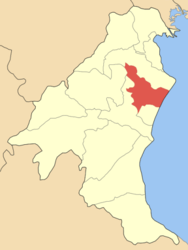Korinos
| Korinos Κορινός | |
|---|---|
 Korinos | |
|
Location within the regional unit  | |
| Coordinates: 40°19′N 22°35′E / 40.317°N 22.583°ECoordinates: 40°19′N 22°35′E / 40.317°N 22.583°E | |
| Country | Greece |
| Administrative region | Central Macedonia |
| Regional unit | Pieria |
| Municipality | Katerini |
| Elevation | 35 m (115 ft) |
| Population (2011)[1] | |
| • Municipal unit | 5,557 |
| Time zone | EET (UTC+2) |
| • Summer (DST) | EEST (UTC+3) |
| Postal code | 600 62 |
| Area code(s) | 23510 |
| Vehicle registration | KN |
Korinos (Greek: Κορινός) is a town and a former municipality in Pieria regional unit, Greece. Since the 2011 local government reform it is part of the municipality Katerini, of which it is a municipal unit.[2] Korinos has approximately 5000 residents and it s located 5 km northeast of the city of Katerini (Κατερίνη), the capital of Pieria. Motorway 1 (Athens - Thessaloniki) is situated to the west. Korinos is famous for its beaches -lying to its east- and hotels in the area, which make the village an ideal place for tourism.
Additionally, Korinos has a public library since 2006.
Korinos became famous in Greece, after an economic scandal (during 2000) concerning the distribution of building grounds from Korinos' municipality to the villagers.
Name
Although the word "Korinos" does not have any meaning in the Greek language and its origin is unknown, there are several different explanations for this name. According to one of them, Korinos was named after the many Korinia (Κορίνεια) trees existed in the area during its foundation (aprx.1900). The second explanation is that Korinos was named after a General. Finally, some people believe that the name originates from the word "καρίνα" (keel), because Korinos Beach was a constructing place for keels.
Subdivisions
The municipal unit Korinos is subdivided into the following communities (constituent villages in brackets):
- Kato Agios Ioannis
- Korinos (Korinos, Paralia Korinou)
- Koukkos
- Nea Trapezounta
- Sevasti
Historical population
| Year | Settlement population | Community population | Municipal unit population |
|---|---|---|---|
| 1981 | - | 3,185 | - |
| 1991 | 3,705 | - | 5,757 |
| 2001 | 4,054 | 4,097 | 6,611 |
| 2011 [1] | 3,487 | 3,543 | 5,557 |
History
Korinos was liberated by the Greek Army and after the end of the Balkan Wars, it finally became a part of Greece after nearly five centuries of Ottoman Rule. After World War II and the Greek Civil War, devastated buildings were rebuilt. Electricity and radio were introduced in the mid-20th century, in the same time, tourism was introduced and later boomed to become its main industry over agriculture, television in the 1980s and computer in the late-1990s along with Internet. On June 9, 2007, a low pressure system that arrived from Southern and Central Europe brought in torrential downpours enough to ruin fruits, vegetable and other crops, it turned several farmlands into ponds and lakes.
Twinning cities
none[3]
References
- ↑ 1.0 1.1 "Detailed census results 2011" (in Greek).
- ↑ Kallikratis law Greece Ministry of Interior (Greek)
- ↑ "Twinnings". Retrieved 2015-01-05.
External links
See also
| ||||||||||||||||||||||||||